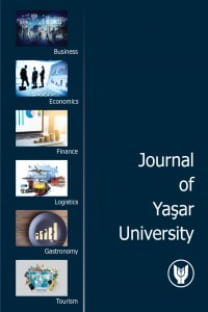Bebeğim için Almak ya da Almamak
Statü tüketimi sosyal medya ile birlikte bir tüketim çılgınlığına dönüşmüştür. Bu etki özellikle hamile kadınlarda veya ilk bebeği olan annelerde görülmektedir. Bu anneler bebekleri için en organik, doğal, özgün ve çekici ürünü satın almakta ve bunu sosyal medya hesaplarından paylaşmaktadır. Aynı zamanda, bu anneler bebeklerini kendi benliklerinin bir uzantısı olarak görerek yeni kimlikleri ile benliklerini genişletmektedirler. Bu kapsamda, çalışmanın temel amacı, genişletilmiş benlik ve statü tüketimi teorileri aracılığı ile bu annelerin bebekleri için yapmış oldukları satın almaları değerlendirmektir. Çalışma için karma yöntem benimsenmiştir. Bunun için hem anket hem de derinlemesine görüşmeler yapılmıştır. Anket sonuçlarına bakıldığında annelerin bebeklerini kendi yansımaları olarak gördüğü anlaşılmaktadır. Bununla birlikte, yaptıkları harcamaların statü tüketimi olduğunu kabul etmemektedirler. Ancak, derinlemesine inildiğinde daha dürüst cevaplara ulaşılmış; annelerin bir sosyal grup tarafından kabul edilme ve en iyi anne olma arzusunun onları statü tüketimine yönlendirdiği derinlemesine görüşme sonuçlarından anlaşılmıştır.
Anahtar Kelimeler:
Bebek, anne, genişletilmiş benlik, statü tüketimi, IOS Ölçeği
To Buy or Not to Buy for My Baby
Status consumption increased with the consumption madness via social media. This effect can be seen in pregnant or first-time mothers with their newborn babies. These mothers buy the most organic, natural, unique and attractive products for their babies and share them on their social media accounts. Also, they make exaggerated expenses in activities like birthday parties and baby showers in order to get the credit of best mother. At the same time, these mothers extend their selves via their babies as they see them a piece of themselves. Within this scope, the main purpose of this research is evaluating these mothers’ purchases for their babies through extended-self and status consumption theory. Mixed method have been used in this research. Both surveys and in-depth interviews have been conducted. Having looked at the results of surveys, mothers see their babies as a reflection of their selves. Nevertheless, they do not accept that they made status consumption. However, the research went in deep, responses that are more honest have been got and in-depth interview results show that because of the desire of being a part of a social group or doing the best thing lead mothers to status consumption.
Keywords:
baby, mother, extended-self, status consumption, IOS Scale,
___
- Afflerback, Sara. 2012. "Rock-a-buy baby: Consumerism by New, First-Time Mothers." Master of Arts, Department of Sociology, University of Central Florida.
- Ahuvia, Aaron C. 2005. "Beyond the Extended Self: Loved Objects and Consumers' Identity Narratives." Journal of Consumer Research 32 (1):171-184. doi: 10.1086/429607.
- Aron, Arthur, Elaine N. Aron, and Danny Smollan. 1992. "Inclusion of Other in the Self Scale and the structure of interpersonal closeness." Journal of Personality and Social Psychology 63 (4):596-612. doi: 10.1037/0022-3514.63.4.596.
- Aydin, Gulnil, Aybeniz Akdeniz Ar, and Çagatan Taskin. 2014. "The Role of Brand Trust on Parents’ Purchase Intentions of Baby-Care Products." Doğuş Üniversitesi Dergisi 15 (2):165-180.
- Bailey, M.T. 2002. Marketing to Moms: Getting Your Share of the Trillion-dollar Market: Prima Pub.
- Bailey, Maria T., and Bonnie W. Ulman. 2005. Trillion-Dollar Moms: Marketing to a New Generation of Mothers. Chicago: Dearborn Trade Pub.
- Başkale, Hatice. 2016. "Nitel Araştırmalarda Geçerlik, Güvenirlik ve Örneklem Büyüklüğünün Belirlenmesi." Dokuz Eylül Üniversitesi Hemşirelik Fakültesi Elektronik Dergisi 9 (1):23-28.
- Bayram, N. 2010. Yapısal eşitlik modellemesine giriş AMOS uygulamaları: Ezgi Kitabevi.
- Belk, Russell. 1988. "Possessions and the Extended Self." Journal of Consumer Research 15 (2):139-168. doi: 10.1086/209154.
- Belk, Russell. 2016. "Extended self and the digital world." Current Opinion in Psychology 10:50-54. doi: https://doi.org/10.1016/j.copsyc.2015.11.003.
- Chaudhuri, Roy, and Sitanath Majumdar. 2006. "Of diamonds and desires: understanding conspicuous consumption from a contemporary marketing perspective." Academy of marketing science review 10.
- Cohen, Joel B. 1989. "An Over-Extended Self?" Journal of Consumer Research 16 (1):125-128.
- Eastman, Jacqueline K., Ronald E. Goldsmith, and Leisa Reinecke Flynn. 1999. "Status Consumption in Consumer Behavior: Scale Development and Validation." Journal of Marketing Theory and Practice 7 (3):41-52.
- Hanley, Adam W., Anne K. Baker, Robert T. Hanley, and Eric L. Garland. 2018. "The shape of self-extension: Mapping the extended self with multidimensional scaling." Personality and Individual Differences 126:25-32. doi: https://doi.org/10.1016/j.paid.2017.12.013.
- Hutchinson, Andrew. 2017. "Brands Need to Know About Marketing to Moms." Social Media Today.
- Miles, M.B., A.M. Huberman, and J. Saldana. 2014. Qualitative Data Analysis: SAGE Publications.
- Noble, Charles H., and Minu Kumar. 2008. "Using product design strategically to create deeper consumer connections." Business Horizons 51 (5):441-450. doi: https://doi.org/10.1016/j.bushor.2008.03.006.
- Özer, Sevtap. 2015. "Genişletilmiş Benlik Teorisi." In Pazarlama Teorileri, edited by Mehmet İsmail Yağcı and Serap Çabuk. İstanbul: MediaCat.
- Siddiqui, Shakeel, and Darach Turley. 2006. "Extending the Self in a Virtual World." Advances in Consumer Research 33:647-648.
- Sivadas, Eugene, and Karen A. Machleit. 1994. "A Scale to Determine the Extent of Object Incorporation in the Extended Self." In Marketing Theory and Applications, edited by C. W. Park and D. C Smith. Chicago: American Marketing Association.
- Trigg, Andrew B. 2001. "Veblen, Bourdieu, and Conspicuous Consumption." Journal of Economic Issues 35 (1):99-115. doi: 10.1080/00213624.2001.11506342.
- Veblen, T. 2015. The Theory of the Leisure Class (Essential Economics Series: Celebrated Economists): Read Books Limited.
- Woosnam, Kyle M., and Kayode D. Aleshinloye. 2013. "Modifying the Inclusion of Other in Self (IOS) Scale and Comparing Residents’ and Tourists’ Perceived Closeness with One Another." 2013 TTRA International Conference, Kansas City, Missouri, USA, 2013.
- Zickfeld, Janis H., and Thomas W. Schubert. 2016. "Revisiting and extending a response latency measure of inclusion of the other in the self." Comprehensive Results in Social Psychology 1 (1-3):106-129. doi: 10.1080/23743603.2017.1298356.
- ISSN: 1305-970X
- Başlangıç: 2006
- Yayıncı: Yaşar Üniversitesi
Sayıdaki Diğer Makaleler
Borsa İstanbul İşlem Hacmini Etkileyen Unsurlar ve Aşırı Güven Eğilimi
Sevilay KÜÇÜKSAKARYA, Mustafa ÖZER
Paranın Değeri Türkiye’ye Gelen Uluslararası Turist Sayılarını Etkiliyor Mu?
Ümit GABERLİ, Coşkun AKDENİZ, Hasan Selçuk ETİ
Bebeğim için Almak ya da Almamak
En İyi Yetenekleri Elde Tutmak: İşveren Markasının ve Psikolojik Sermayenin Etkisi
